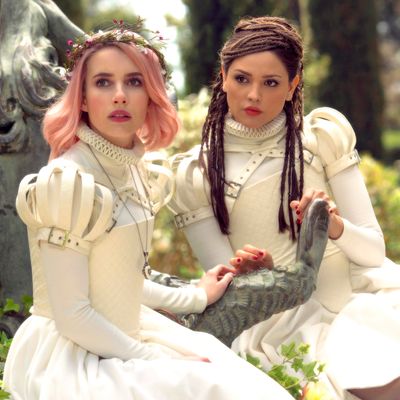
Sundance — it’s not all actors you recognize from TV playing neurotic bed-hopping Brooklynites! Occasionally you get a movie with ambitions so outsized you have to applaud the audacity of the vision, even if you aren’t quite sure it’s exactly good. That’s the case with Paradise Hills, the debut feature from Spanish writer/director Alice Waddington, who, as she told the crowd before the movie’s world premiere Saturday night, has been tinkering with some version of the narrative since she was a teenager. So many times, the only young women in genre fiction are the ones by men; this movie, she explained, was her go at creating a female-driven fantasy world of her own. (Though the script is credited to two men, Nacho Vigalondo and Brian DeLeeuw, Waddington has story credit.)
Like The Hunger Games, Paradise Hills takes place in a candy-colored dystopian world marked by strictly defined social castes. “Uppers” are the elites, who have flying cars, impeccable wigs, and the kind of decadent lifestyle that brings to mind the golden days of the Romanoffs. We see a lot less of the “lowers,” but they’re the downtrodden proletariat in a sci-fi film, so whatever you can imagine their lives are like, it’s probably even worse than that.
Going against what numerous T-shirts would have you believe, patriarchal values are alive and well in this future: Our heroine Uma (Emma Roberts) is an Upper in genteel poverty, about to be married off against her will to the loathsome magnate whose business machinations caused the suicide of her father. She’s understandably upset about this, so her family ships her off to Paradise Hills, an island wellness retreat devoted to transforming unruly female Uppers into the kind of docile, demure women society treasures. Amarna (Eiza González) is a pop star who wants to change her sound, Chloe (Patti Cake$’ Danielle MacDonald) is a good-natured Southerner whose family wants her to lose weight, and Yu (Awkwafina) is an upwardly mobile Lower with anxiety. They’re all treated to luxurious spa treatments, group yoga sessions, and Alice In Wonderland-style meals that have all sorts of magical effects.
It’s clear from the jump that the treatment is even more nefarious than it appears, and the film’s first two acts unfold with the twisted logic of a fairy tale, and the bizarre plotting of a dream. Paradise Hills truly has everything: brainwashing sessions on top of a carousel horse suspended 40 feet in the air; lesbian subplots that emerge out of nowhere; Milla Jovovich as a Nurse Ratched type with magical powers; editing that might be elliptical, or might just be bad. But the third act at least is full of pleasantly spiky twists that suggest more interesting ideas and world-building than the rest of the movie gives us. In the moment, my audience seemed to dig it, though once the lights went up, I heard a few grumbles that, like many debuts, there might not have been enough there there.
Still, it’s fun to look at. Waddington previously worked in advertising and fashion photography, and she fills the film with the imagery of a middle-class man’s Tarsem: pristine white uniforms that recall medieval armor, a wedding banquet that borrows looks from every decade of the 20th century, enough flowers to fill an entire Caroline Calloway tour. I don’t know if Paradise Hill works well as the revisionist feminist fable Waddington intended, but as inspiration to generations of cosplayers to come, it’s fantastic.


